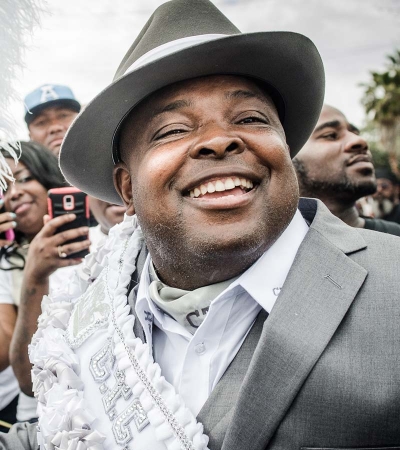My family is from the Lower Ninth Ward. My mama, Madeline Scott, grew up with her mother, Alma Scott, on 2500 Monticello between Law and Dorgenois. She was a single mom. When she had kids, I guess she didn’t want to stay with my grandmother, so she found an apartment in the Florida Projects. Every weekend, we went to see my mama’s family across the canal. My mother raised me and my two other brothers while working at the Hilton Hotel by the river. She had to catch the Desire bus until she got her car. My other two brothers are deceased, and she’s deceased too. She died ten years ago. I’m the only one still living. I miss my mom. I really do. I got pictures of her following behind my second line—that’s the only second line she went to.
I had to survive in the projects. You’re fighting every day down there. You know how it is: Everybody tries to test your stamina to see if you scary. A lot of people know that my family was from across the canal: “Oh, he ain’t from the projects.” I made friends, but to be honest, most of my friends I grew up with are dead or in jail. Got killed slinging drugs. Somebody trying to rob or kill them; a turf war thing. Only about five percent are still living on the street right now. When you see somebody you ain’t seen in a long time, that means you're doing something good with yourself.
Sometimes when I go to the rodeo at Angola, I’ll see someone and be like, “Damn, man, I thought you was dead!” And they’re like, “Man, I'm still living.” The first thing they ask, “You put some money on my books?” A lot of them guys don’t have parents no more. They’re parents are dead. They’re on their own up there. They don’t have family to take care of them. You'd be surprised how people survive in jail. They got to—they ain’t got no choice. Guys come up with all that murder, and they can't use no gun up there. You got to learn how to fight. And if you don’t fight, they turn you out. You got them young boys' moms and them sending money. They take their money and put it in the older guys' store because they bully them.
But selling drugs to make money ain’t me. I’ll tell you one thing, it was tempting because, back in the day, I was making $3.25 an hour. If I get an ounce of weed for 50 dollars and sell each joint for three dollars, I could make more than what I make at the job for eight hours. Which one would you do? But my mama always kept a job. She said, “You gotta work hard for something if you want it.”
When I was 14, my brother started working at the 1984 World's Fair as a kitchen supervisor in an Italian restaurant. He told them he really needed three dishwashers in the morning time. Every time they hired somebody, they trained them, and then they would quit to work at other places in the World’s Fair where people were paying more money. I took the job. After the World's Fair, I left I worked at the Plimsoll Club at the top of the World Trade Center.
In 1989, my brother got me a job at the Tricou House, a jazz and blues bar, at 711 Bourbon Street. It had a big courtyard with a blues bar downstairs where an old piano player named Al Broussard played. Upstairs, there was a dance club upstairs where Danny T. Band played zydeco. I started there as a dishwasher, they made me a busboy in two weeks, and a waiter two weeks after that. From there, I became assistant manager, bartender, and finally general manager for 16 years until they sold it three years after Katrina. I decided I didn’t want to do Bourbon Street no more. I could have gotten another job there, but I wanted a different scene. I started doing trucking jobs out of town until I got diagnosed with diabetes. I haven’t been doing anything since I’ve been on dialysis. I’ve gone on disability.
Masking and Second Lines
Growing up in the Florida, we had DJs out there every Sunday like DJ Carriere and Manny Fresh. On my daddy’s side, my auntie, Marjorie Carter, used to second line with the Lady Jolly Bunch. She was an original, and I would go with my cousins—her children.
My grandpa used to be a Mardi Gras Indian, too. To be honest with you, he might have been renegade because in all the time I used to see my grandfather, it was only him and another guy on the street. We used to follow them. In 1997, I started masking with my friends, the Comanche Hunters. Here’s how it began. This guy named Romales Harris and I were working at a café on Decatur Street in the French Quarters. We were talking about how Keith “Kiki” Gibson was running a renegade gang flag. He just wanted a mask and put on a suit. Everybody like, “Man, Keith masking.”
I said to Romales, “What Keith get wanting to be an Indian? Keith never did no Indian in his life.” I kept saying that. And Romales was like, “Keith mad, but he clean, too, bra. I seen his patches.” I said, “I'm gonna go see him Mardi Gras morning.” When I seen Keith, I was like, “Lord, have mercy!” Man, he was so pretty.
I said, “Damn, I'm gonna mask.” I started talking to Keith and he said he wanted to start his own gang. A guy named Percy Francois already started the Comanche Hunters. He had a little queen named Jo’shanique and he was like, “Man, I just need a big chief.” Keith said, “I'll be the Big Chief.” Darryl Keyes became the gang flag, I was the flag boy, and Ro was the wild man. When we came out, the other Ninth Ward gangs was mad. We used to go against Ronald Lewis’s gang, the Choctaw Hunters, and the Ninth Ward Hunters with Rudy Bougere. We was the up and coming. Alphonse “Dowee” Robair started wanting to mask because of us. I got to give him his credit, he good. He do his own thing.
The first year I masked we only had six Indians. The second year, we had ten, and then after that we were 17. We came out of Rocheblave and Charbonnet by Kiki’s mama’s house. I masked all the way from ‘97 to 2003 and made my way to gang flag. They still didn’t replace me. You got to sew to replace me!
Around the same time, Jermaine and Eddie started a club called CTC, but they hadn’t paraded. They were making T- shirts and hitting the sidewalk with the other sidewalk dancers. They liked how I used to sew and mask. They was like, “Big Nine, they got all them old people in the club. Man, we been trying to get this club on the map for a while and we can't do it. We need somebody like you to help us out like that.” They wanted to hit the street with a band. I said, “I'm gonna help y’all out, but I'm gonna let y’all know I'm dedicated to my Indian stuff.”
I went and talked to Mr. Ronald Lewis with the Big Nine. He told me, “First of all, you got to have a two-hour parade to christen your banner. Then y’all can parade with me.” He gave me a price of how much it would cost to parade, and we gave them the money and paraded with them. We had the best band with Rebirth because me and Phil is best friends.
But I ain’t like Robert Starks’ rules. He said, “Y’all can’t get out the line. Y’all can't jump on nothing.” But I let my club members go on top of the steps with the suits on. You know, get out the line. I said, “I’m gonna go on my own.” Ronald was really disappointed, but I said, “I don’t want to cause no confusion with you and Robert Starks.”
I went to Mr. Norman Dixon, Sr. and he taught me how to do everything—how to get the police, the permits, and how to get in line to get your own parade and all that so that’s how I got on my own. When I was as doing all that, I was the vice president of the club, but I knew how to talk to people to get stuff done. When I first started, they only had 27 clubs. Dumaine Gang came out in 1999, and we started in 2000. Everybody wanted to dress up and do their thing from their hood.
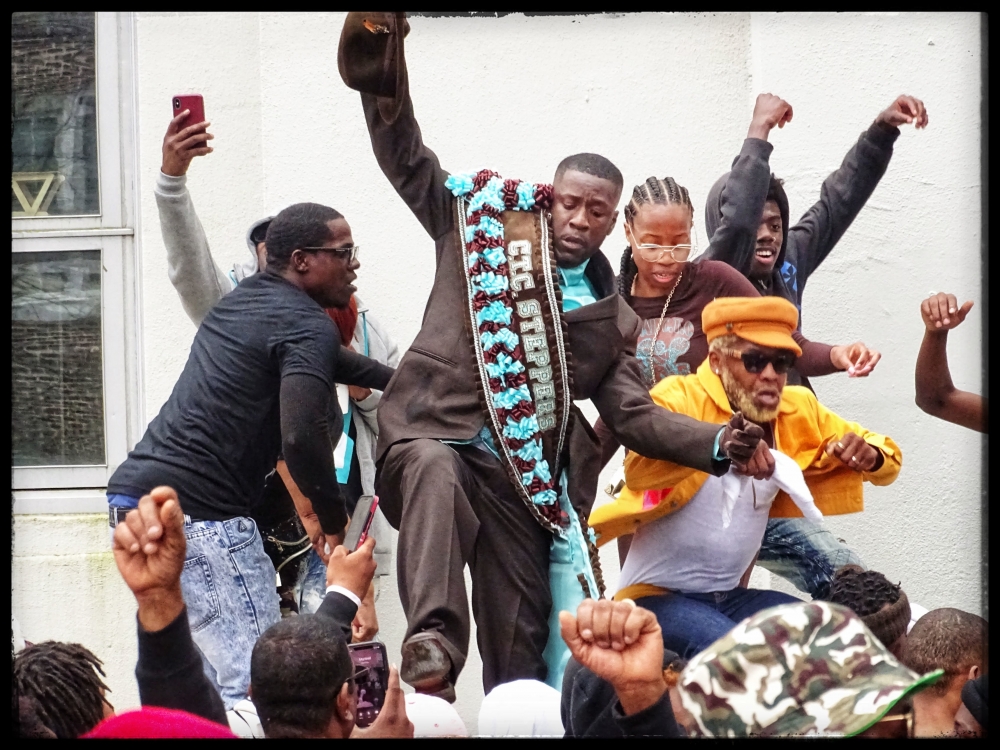
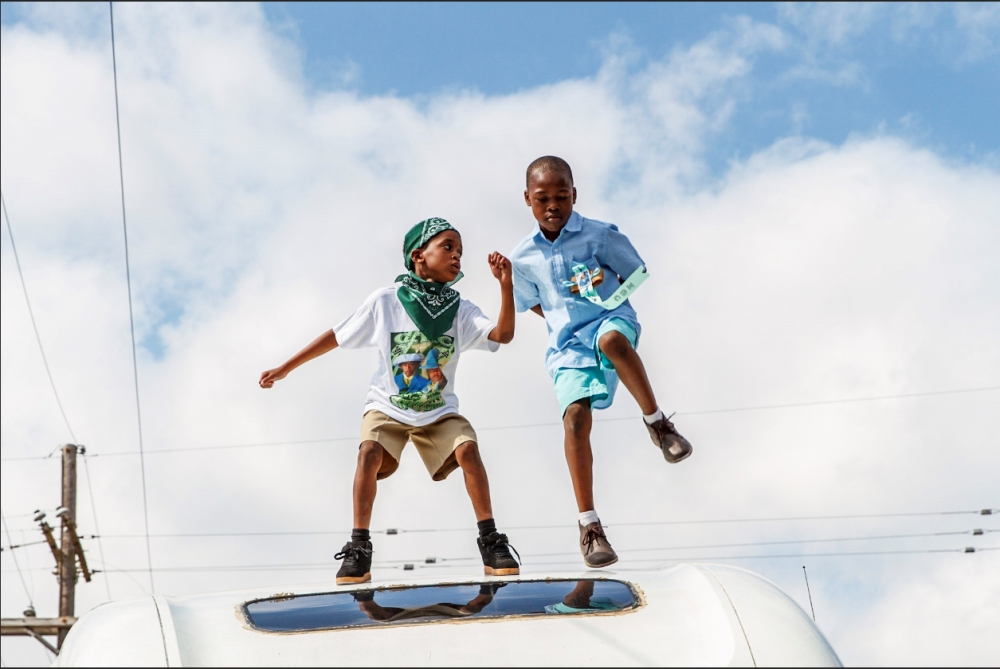
In 2003, Jermaine and Eddie didn’t parade. My wife, Dorothy Scott, and I went uptown for the Original 4 parade, and I was like, “Damn, they clean as a motherfucka.” My wife was like, “I know the dude who did the work.”
“Know him?”
She said, “Yeah, he used to mess with my girl.”
I said, “He do some good work, man.”
After the parade, my wife introduced me to Kevin Dunn, and we got tight. I call him Big Brother he calls me Little Brother. He started doing all of my work for the parade.
After Katrina
Katrina was rough on my family. When the storm hit, I stayed on Spain and North Claiborne in the Eighth Ward. The water got in the house, but it wasn’t that bad. I was able to save the photo albums because they were on the top of my chest of drawers, and I kept most of my furniture because the water didn’t sit in the house too long. We were displaced in Houston and the other founders of the CTC went to Dallas. They said they wasn’t coming back, but I wanted to come back home. I just didn’t like how the people were treating us in Texas, calling us refugees. I got money! One of our members, Everdia Perkins, kept calling me, “When we going to parade?” I knew her all my life, and she and my wife had got tight being in the club together.
I was like, “Girl, the city is closed. We can't parade!”
Two weeks after we got off the phone, in November of ‘05, she was driving with her family—Owinder Taylor, Korey Taylor, and Tremaine Perkins. They got in a car accident on I-10 in Acadia Parish. All of them died. My wife and I had to go identify the bodies because they ain’t had no other emergency contact. My wife took that hard. I ain’t lying, I told my wife, “When I come back, I'm coming back with a U-Haul.” I refused to stay in Houston.
From then, I had it in my mind I was coming home, and I wasn’t let the club go. In December 2005, I bought the house I'm in right now in Metairie and started looking for Dunn. I couldn’t find him, so I went by his mama’s house on Annunciation, right off Tchoupitoulas where they didn’t get no water. She gave me his number ‘cause he was in Dallas. He lost everything and had a new apartment. I said, “I want you to come back, bra.”
He said, “I ain’t got nothing. I ain’t got no staple gun, I ain’t got no glue gun. I'm going to have to get my sewing machine fixed.”
I said, “Look, man, let me tell you something. I'm going to put your machine in the shop. I'm gonna pay for it to get out. I'm gonna buy all the glue guns. I'm gonna buy whatever you need.” I bought his ticket to come back down here, he brought all his furniture back down, and that’s how he came back.
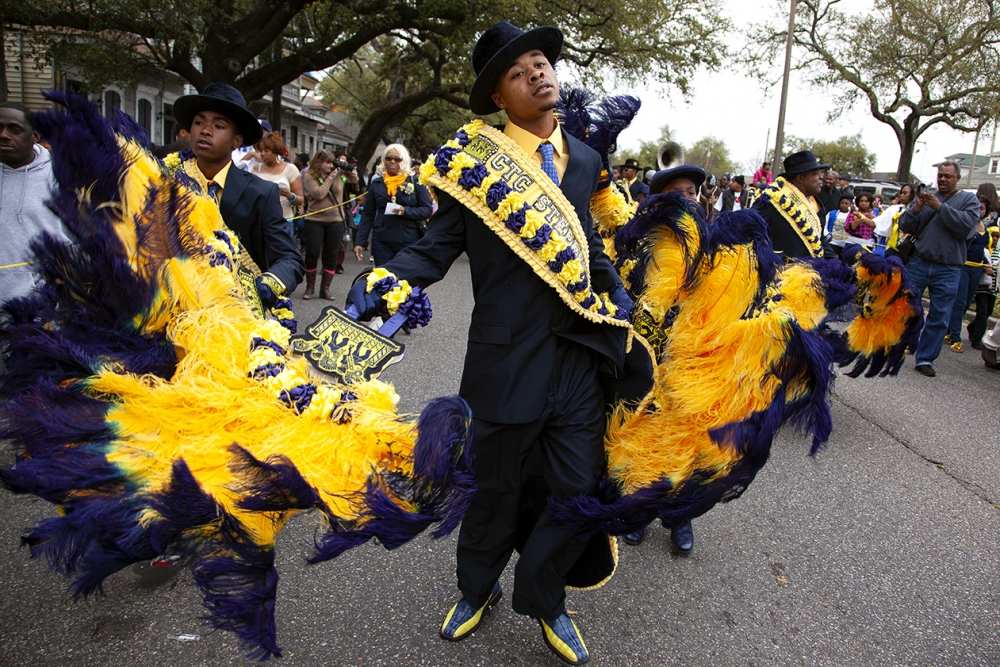
CTC came back in the beginning of 2007. That year, Dunn put birds on our streamers and fans for Everdia. Our route was from St. Claude and Lesseps, all the way up St. Claude, hit Elysian Fields, up North Miro and all the way till we hit Seal’s. Then we went over to The Other Place on St. Bernard. I liked going uptown, I’ll be honest with you. I did it for five years in a row, but the club was getting mad not to be across the canal so we went back home.
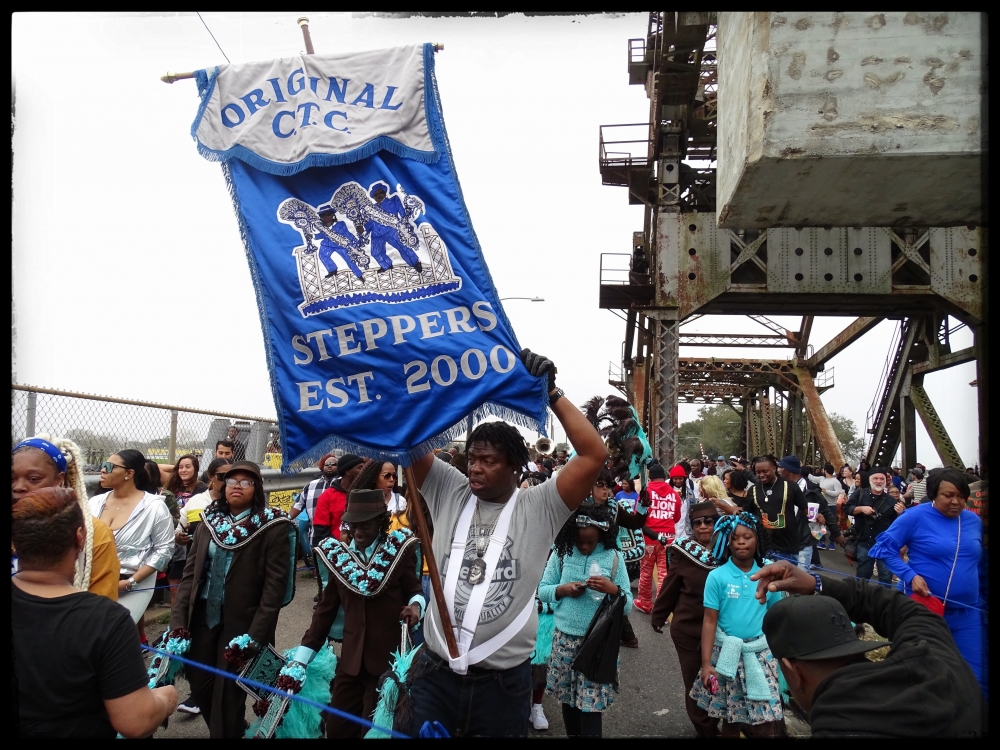
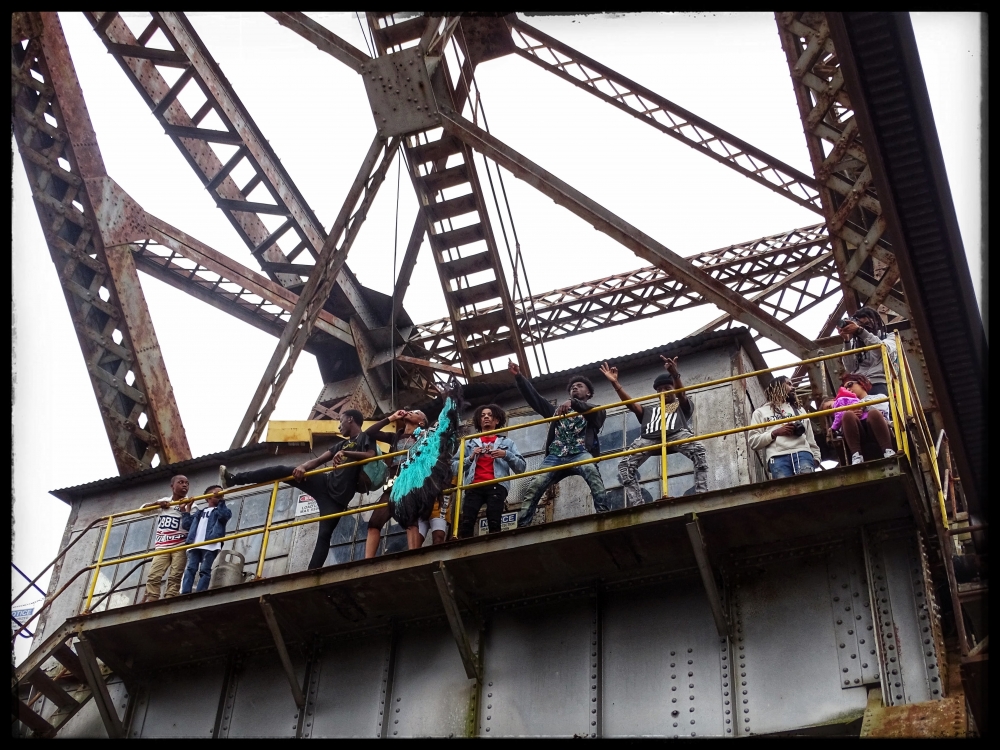
Dunn continues to do all of our work, except for two years when I wore the khaki and green, and the yellow and blue. Those years, Adrien “Coach Teedy” Gaddies from Sudan did baskets for us.
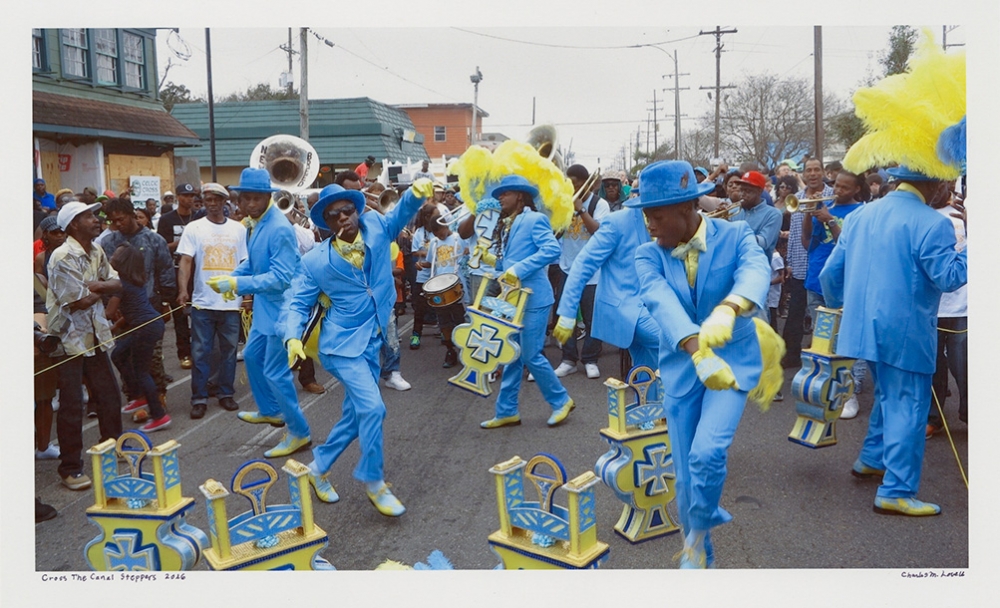
All my queens pick the colors of our parades, and I go out and try to find clothes. I’m going to be honest, sometimes it's really hard to find colors they pick, but I make it happen. The only rule is that you can't ever pick the same colors we done wore already. My wife used to parade with me, but for the last eight years she’s been parading with the Lady Buckjumpers because she wanted to be with her own girls’ club.
I done had all the bands with CTC. I had Phil with the Rebirth for the first six years. To me, Phil and them play the real second line jazz music. Then I went to book Hot 8, the Stooges, TBC, and now we got the Big 6. I go with who hot, but the music has changed. It's not second line music—it's more like dancing music.
Three years ago, I had lung surgery to take a cyst off and I ain’t been the same since. I can't even go a block no more without being out of breath. It's crazy. I'm going up the bridge during the parade, and I couldn’t even breathe. I had to get in the police car to get on the other side. I know I can't second line no more, but I'm going to ride with my own float.

